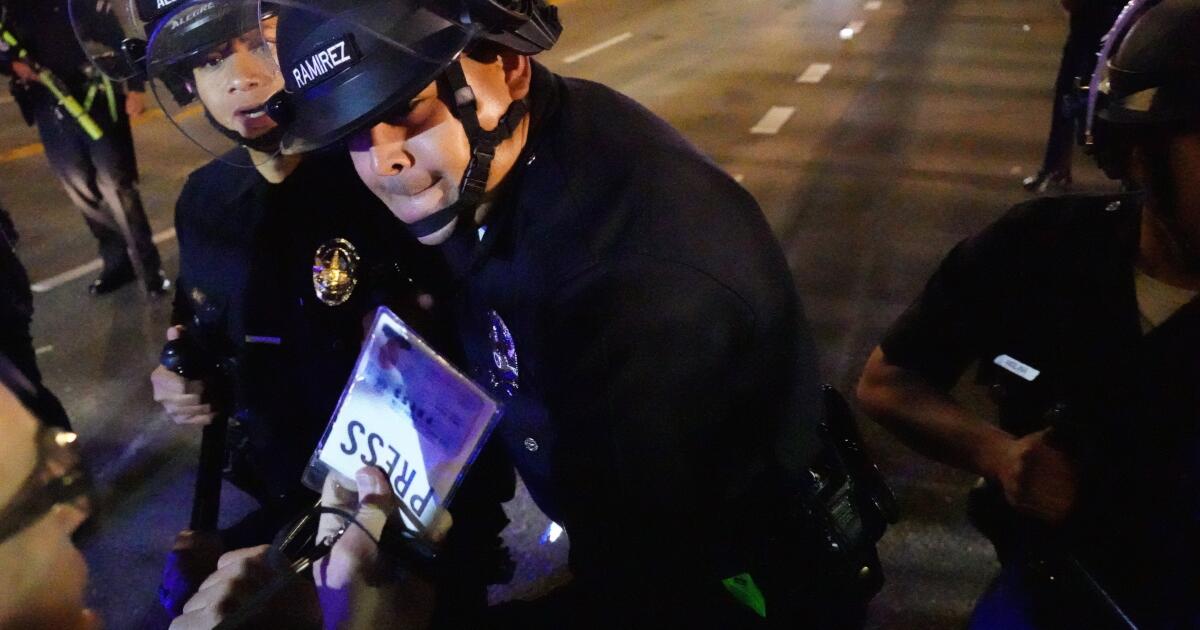L.A. council rebukes city attorney over ban over crowd control weapons on journalists
In a rare public rebuke, the Los Angeles City Council pressed the city’s top lawyer to abandon her attempt to halt a federal judge’s order prohibiting LAPD officers from targeting journalists with crowd control weapons.
One day before “No Kings” demonstrations against the Trump administration were set to launch in L.A. and elsewhere, the council voted 12-0 to direct City Atty. Hydee Feldstein Soto to withdraw her request to lift the order.
Hours later, Feldstein Soto’s legal team did just that, informing the judge it was pulling back its request — around the same time the judge rejected it.
Since June, the city has been hit with dozens of legal claims from protesters and journalists who reported that LAPD officers used excessive force against them during protests over Trump’s immigration crackdown.
The lawsuit that prompted the judge’s ban was brought by the Los Angeles Press Club and the news outlet Status Coup, who pointed to video evidence and testimonials suggesting that LAPD officers violated their own guidelines, as well as state law, by shooting journalists and others in sensitive parts of the body, such as the head, with weapons that launch projectiles the size of a mini soda can at speeds of more than 200 miles per hour.
“Journalism is under attack in this country — from the Trump Administration’s revocation of press access to the Pentagon to corporate consolidation of local newsrooms,” Councilmember Eunisses Hernandez, who introduced the motion opposing Feldstein Soto’s legal filing, said in a statement. “The answer cannot be for Los Angeles to join that assault by undermining court-ordered protections for journalists.”
In a motion filed Wednesday, Feldstein Soto’s legal team sought a temporary stay of the order issued by U.S. District Judge Hernán D. Vera. She reiterated her earlier argument that Vera’s ban was overly broad, extending protections to “any journalist covering a protest in [the City of] Los Angeles.”
The city’s lawyers also argued that the ban, which bars the LAPD from using so-called less lethal munitions against journalists and nonviolent protesters, creates “ambiguous mandates” that jeopardize “good-faith conduct” by officers and pose “immediate and concrete risk to officer and public safety.”
In addition to Feldstein Soto’s request for a temporary stay, the city has filed an appeal of Vera’s injunction. The U.S. 9th Circuit Court of Appeals is taking up the appeal, with a hearing tentatively set for mid-November.
Council members have become increasingly vocal about their frustrations with the city attorney’s office. Two months ago, they voiced alarm that an outside law firm billed the city $1.8 million in just two weeks — double the amount authorized by the council. They have also grown exasperated over the rising cost of legal payouts, which have consumed a steadily larger portion of the city budget.
After Feldstein Soto’s motion was reported by LAist, several city council members publicly distanced themselves from her and condemned her decision.
In a sternly worded statement before Friday’s vote, Councilmember Hugo Soto-Martínez wrote that the city attorney’s “position does not speak for the full City Council.”
“The LAPD should NEVER be permitted to use force against journalists or anyone peacefully exercising their First Amendment rights,” said the statement from Soto-Martínez, who signed Hernandez’s proposal along with Councilmembers Ysabel Jurado and Monica Rodriguez.
On Friday, the council also asked the city attorney’s office to report back within 30 days on “all proactive litigation the Office has moved forward without explicit direction from the City Council or Mayor since July 1, 2024.”
Rodriguez said that Friday’s vote should send a message that the city council needs “to be consulted as a legislative body that is independently elected by the people.”
“What I hope is that this becomes a more permanent act of this body — to exercise its role in oversight,” she said.
Carol Sobel, the civil rights attorney who filed the lawsuit on behalf of the plaintiffs, welcomed the council’s action. Still, she said Feldstein Soto’s filings in the case raise questions about whose interests the city attorney is representing.
“Sometimes you say ‘Mea culpa, we were wrong. We shouldn’t have shot people in the head, despite our policies,’” she said.

